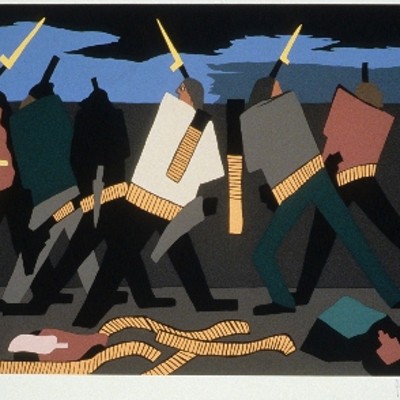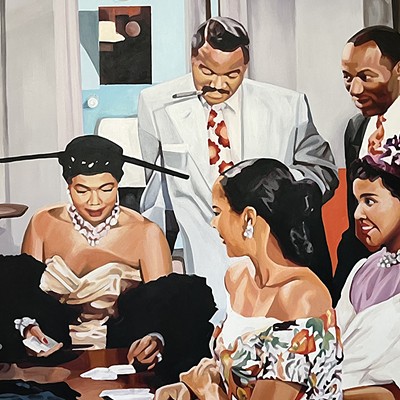"Cry" is the 1971 solo that Alvin Ailey composed for his protégée, the dancer Judith Jamison. Only a few women have danced it since the legendary Jamison did, and the part was given to Smallwood soon after the initial training. Smallwood had been rehearsing only pieces of it until a tour of Japan, when Jamison called her to the studio and readied her to perform the entire work alone.
"It's such an honor," said Smallwood, whose fireball dancing has already been compared to Jamison's. "All the women who have been given the dance are wonderful."
Ailey fans get to see the 26-year-old Smallwood dance the coveted part when the Dance Theatre alights in Tucson for a two-day visit to Centennial Hall this weekend. She performs "Cry" at the Sunday afternoon show. Ailey's most famous piece, "Revelations," recently named the top dance work of the 20th century by Dance magazine, will be performed both Saturday evening and Sunday afternoon, but otherwise the programs differ.
Besides "Revelations," the Saturday night show features "Grace," a 1999 work by Ron Brown, and "C# Street B flat Avenue," by Jawole Willa Jo Zollar, artistic director of the dance troupe Urban Bush Women.
On Sunday afternoon, in addition to "Cry" and "Revelations," the Dance Theatre will perform another signature Ailey work, the 1970 "Streams," and Ulysses Dove's 1984 "Bad Blood."
"Revelations" was composed back in 1960, soon after Ailey changed modern dance forever by revving it up with African-American forms. He came out of Texas, and his gospel-infused "Revelations" is based on what he called his "blood memories" of the churches and folk religion of the Texas back country. Divided into three parts, it's performed to an exhilarating tapestry of spirituals, such songs as "Fix Me, Jesus" and "I Wanna Be Ready."
"We weren't surprised it got first place," Smallwood said. "You'd think after all these years it would lose its magic but it doesn't. It depicts a truthful era of history. It delves into so much of people's lives, and how they live and prosper."
"Cry," composed as a birthday present for Ailey's mother, is "for all Black women everywhere -- especially our mothers," according to a program note. It's set to a score of jazz music by Alice Coltrane, Laura Nyro and Chuck Griffin. In its historical sweep, the work reminds Smallwood of "Revelations."
"It's about the struggle and triumph of black women," Smallwood said. "One hundred years ago, 50 years ago and today...I have to look to all the women in my life to be able to dance this piece."
Smallwood finds herself particularly well placed to pay tribute to black women. One of four children of a single black mother, Smallwood was raised in brownstones in Brooklyn's rough Bedford Stuyvesant neighborhood. But her mother never allowed her kids to taste the dangers of the streets.
"My mother is an extraordinary woman," she said. "I don't remember struggling. She had me in everything, track and field, piano, acting and dance."
Her mom scoped out the decrepit New York City school system too, and got Dwana into the La Guardia High School of the Performing Arts. Her youngest, a son, is now enrolled at Stuyvesant High School for the academically gifted.
But of all the programs Smallwood's mother offered, "it was dance that really caught me. I went to the Martha Graham School after school from 4 to 6 p.m., and did my homework on the train." She also studied at the Brooklyn Jubilation School, and after high school went on to the North Carolina School of the Arts. She always knew that "Ailey was my goal. It's pretty much it for me. It allows you to express yourself and live life."
Jamison is the latest black woman to mentor Smallwood. No longer dancing, Jamison has been director of the company since Ailey's death in 1989. Smallwood idolized her for years, and after joining the company at the tender age of 21, "For two years I was starstruck. I'd just be standing there (in rehearsals) and going, 'Wow.' She'd say, 'Dwana? Dwana?' "
Critics have compared Smallwood's mesmerizing dancing and dark beauty to Jamison's. Said one: "She shares Jamison's powerful, radiant projection and the ability to convince you that it's emotion, not mere technique, that gives dancing its eloquence."
The young dancer is aware of the analogies, but has a typically modest response.
"I don't like to own up to it," she said. "It's too much pressure, but it's an honor indeed."
The Alvin Ailey American Dance Theater performs at 8 p.m. Saturday, and 2 p.m. Sunday, April 8 and 9, at UA Centennial Hall, 1020 E. University Blvd. Tickets range from $36 to $48, with discounts of 20 to 50 percent available for children, students, and UA faculty and staff. For reservations and information, call the Centennial Hall box office at 621-3341.











